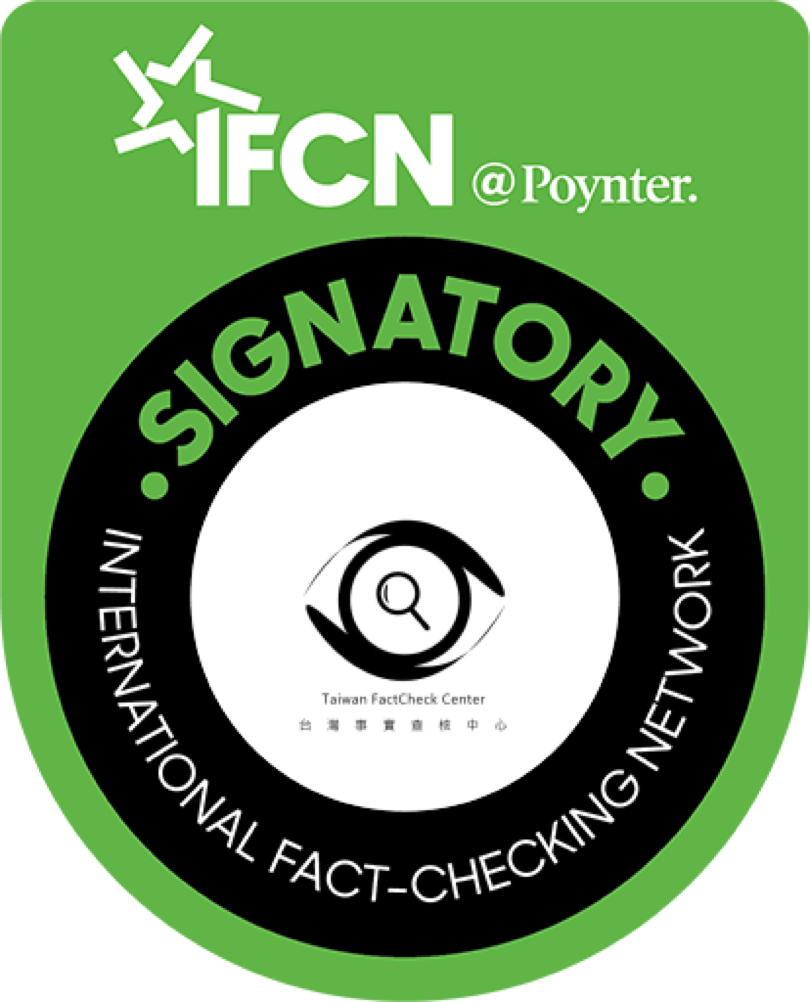【外交政策】Taiwan’s War on Fake News Is Hitting the Wrong Targets
【外交政策】Taiwan’s War on Fake News Is Hitting the Wrong Targets
【2020年1月10日 外交政策/Feature】
The fight on Chinese disinformation has become dangerously partisan.
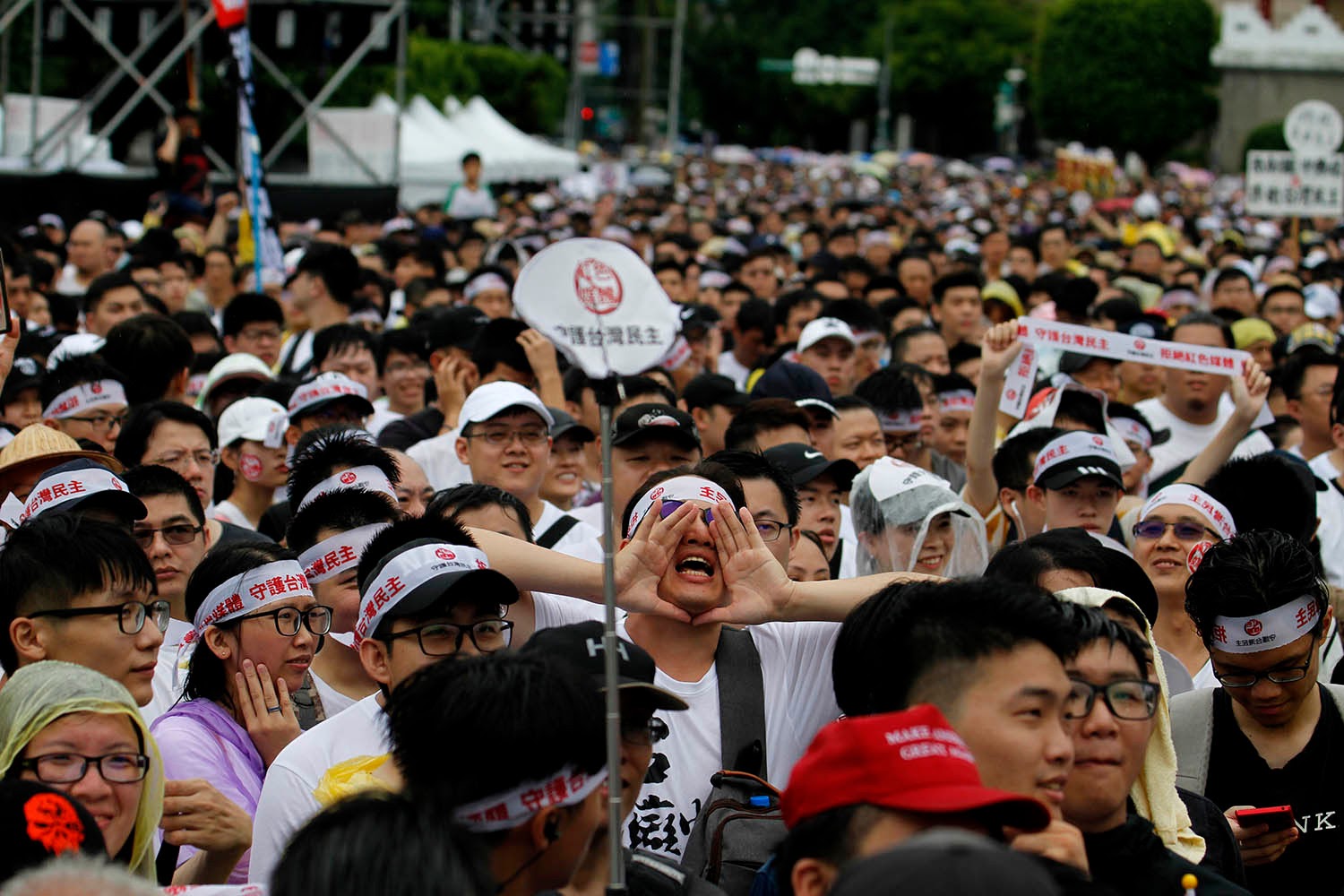 Thousands of protesters hold placards with messages calling to “Reject red media and safeguard the nation's democracy” during a rally in Taipei, Taiwan, on June 23, 2019. HSU TSUN-HSU/AFP VIA GETTY IMAGES
Thousands of protesters hold placards with messages calling to “Reject red media and safeguard the nation's democracy” during a rally in Taipei, Taiwan, on June 23, 2019. HSU TSUN-HSU/AFP VIA GETTY IMAGES
Taiwanese President Tsai Ing-wen faked her college degree. And she’s a secret lesbian who wants to corrupt Taiwan’s children. And she’s selling out the country to Japan and the United States.
None of this is true—but it’s been all over parts of Taiwanese social media. A flood of disinformation has threatened to drown Taiwan in the months before this weekend’s election. Media coverage has focused on the role of Chinese intelligence, which has a vested interest in discrediting Tsai, seen as an advocate of Taiwanese independence.
In response, Taiwanese authorities have rushed to establish laws and institutions to combat this so-called fake news—following in part the models of Russian neighbors such as Finland and Estonia. Last week, Taiwan passed a law targeting Chinese infiltration in the nation’s democratic institutions. But new rules have left Taipei seeing Beijing’s hand behind every online rumor—and experts warn they may prove more counterproductive than helpful.
One case exemplifies this: that of Su Chii-cherng, the director of Taiwan’s representative office (the equivalent of a consulate) in Osaka, Japan, who was tragically caught up in a bizarre series of events in September 2018. Taiwan was rocked that month by a false report claiming that Taiwanese travelers stranded at Osaka’s Kansai International Airport during a typhoon had been rescued by buses sent by the Chinese Embassy.
The story, originally posted on a Reddit-like forum called Professional Technology Temple (PTT), was quickly circulated by both Taiwanese and Chinese media outlets, including the state-run tabloid Global Times. It led to a torrent of online criticism directed at Su, who killed himself eight days later. The initial account was quickly proved false, but it spawned several subsequent waves of bad information. Taiwanese media, citing a report by the Japanese broadcaster NHK, widely reported that Su had taken his own life due to mounting pressure over the resulting spread of false information. However, his widow later disputed this, saying in a statement he had feared “anticipated humiliation” by his superiors.
Questions also arose as to the source of the original PTT post. Shortly after the incident, the post was allegedly traced by internet users to an IP address in China. Incensed government officials spoke of the post as a malicious Chinese plant. In October, weeks before Taiwan’s regional elections, Mainland Affairs Council Deputy Minister Chen Ming-chi said the post “originated from a content farm in Shanghai.”
The incident was thus held up as symbolic of the threat posed to Taiwan by Chinese influence operations. It was widely cited by international media, by a Reporters Without Borders report, and by Tsai herself in a March 2019 interview as an example of “fake news” originating in China with malicious intent to target Taiwan.
However, in December 2018, a court in Taiwan’s Nantou County alleged it had identified a Taiwanese university student as being responsible for making the original post online. And the scandal surged back into the headlines last month after Slow Yang, a YouTuber and prominent supporter of the ruling Democratic Progressive Party (DPP), was charged by a Taipei court with hiring internet trolls to criticize Su’s office.
The salacious nature of the original claim proved attractive to media outlets in both Taiwan and China. “The narrative of the PTT post plays into one Beijing wants to perpetuate and was ultimately able to capitalize off of, in painting the current DPP administration as ill-equipped to govern,” said Jessica Drun, a fellow at the Center for Advanced China Research.
The courts, however, allege that much of the disinformation fracas—including, potentially, the post that sparked it all—originated not in China, but in Taiwan.
The revelation should have highlighted the well-known difficulties in determining the actual scope, intent, and efficacy of state influence campaigns—along with the reality that, while Beijing aggressively attempts to influence Taiwan’s democratic institutions spanning from its media outlets to its temples, most disinformation circulating through Taiwan’s online ecosystem comes not from China but from within the country.
Government officials who had pinpointed the incident as an example of Chinese meddling during election season never provided evidence of their claims, nor have they since issued corrective statements.
Government officials who had pinpointed the incident as an example of Chinese meddling during election season never provided evidence of their claims, nor have they since issued corrective statements.
Instead, Taiwan launched into a drive to combat Chinese-influenced news, often referred to as “red media,” that has gained support from the DPP but has faced virulent pushback from voices within both the opposition Kuomintang (KMT), which takes a softer stance toward Beijing, and from press freedom advocates worried the cases could disrupt Taiwan’s commitment to free speech. “When people found that this news was posted by a college student in Taiwan, this made the DPP look really bad,” said Wu Jun-deh, a disinformation researcher at Taiwan’s state-funded Institute for National Defense and Security Research. The incident, Wu said, gave the KMT and its supporters the opportunity to question the DPP’s credibility when it discusses Beijing’s desire to meddle in Taiwanese politics.
That hasn’t stopped the DPP. After the passage of last week’s anti-infiltration law, Tsai insisted it would not target the media. “No upright media company operating in Taiwan would engage in illicit activity on China’s behalf,” she said. The law, seen by supporters as essential to rooting out Beijing’s meddling in Taiwan’s politics, has galvanized the DPP and, along with Tsai’s support of pro-democracy protests in Hong Kong, given it momentum leading into Saturday’s presidential and legislative elections.
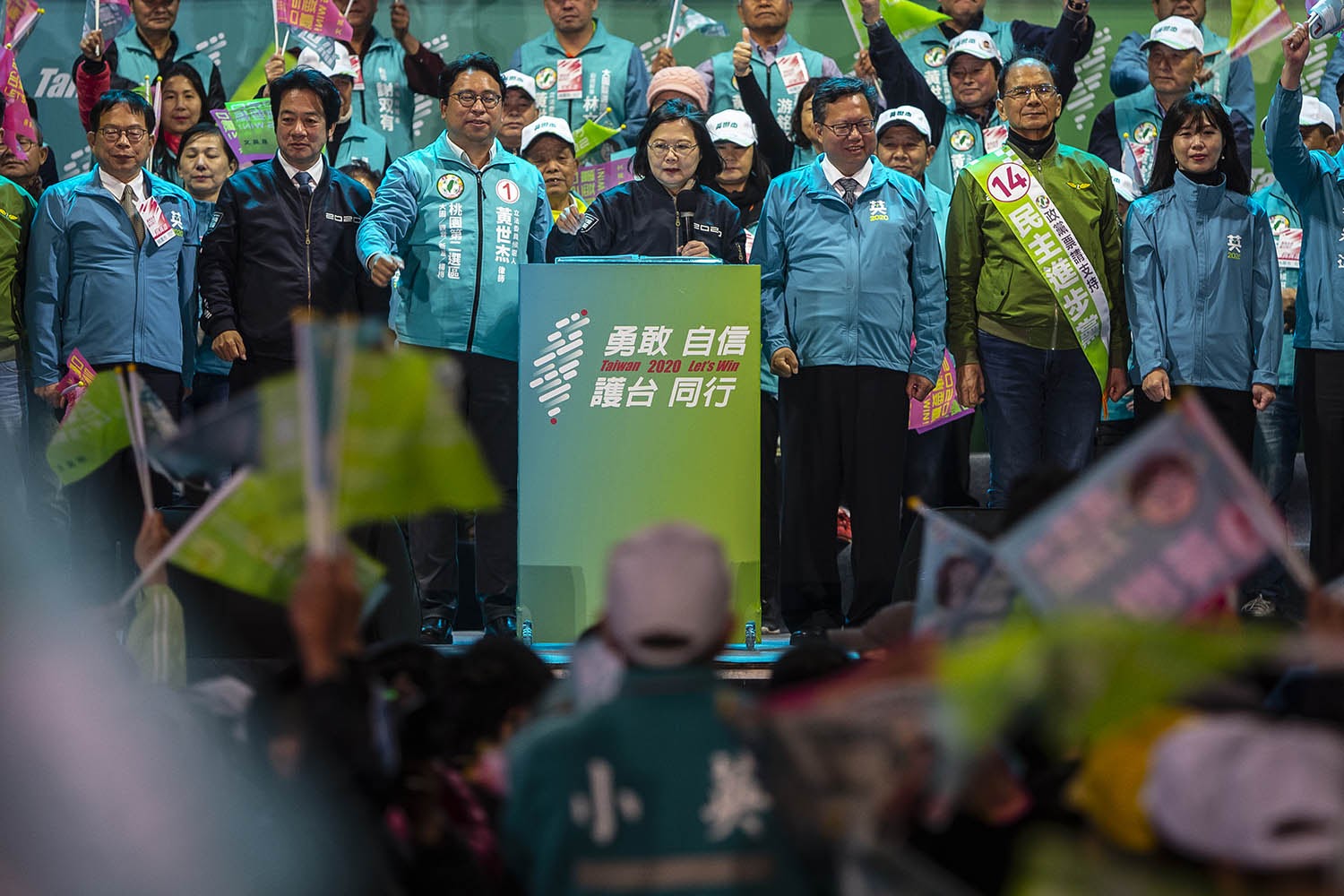
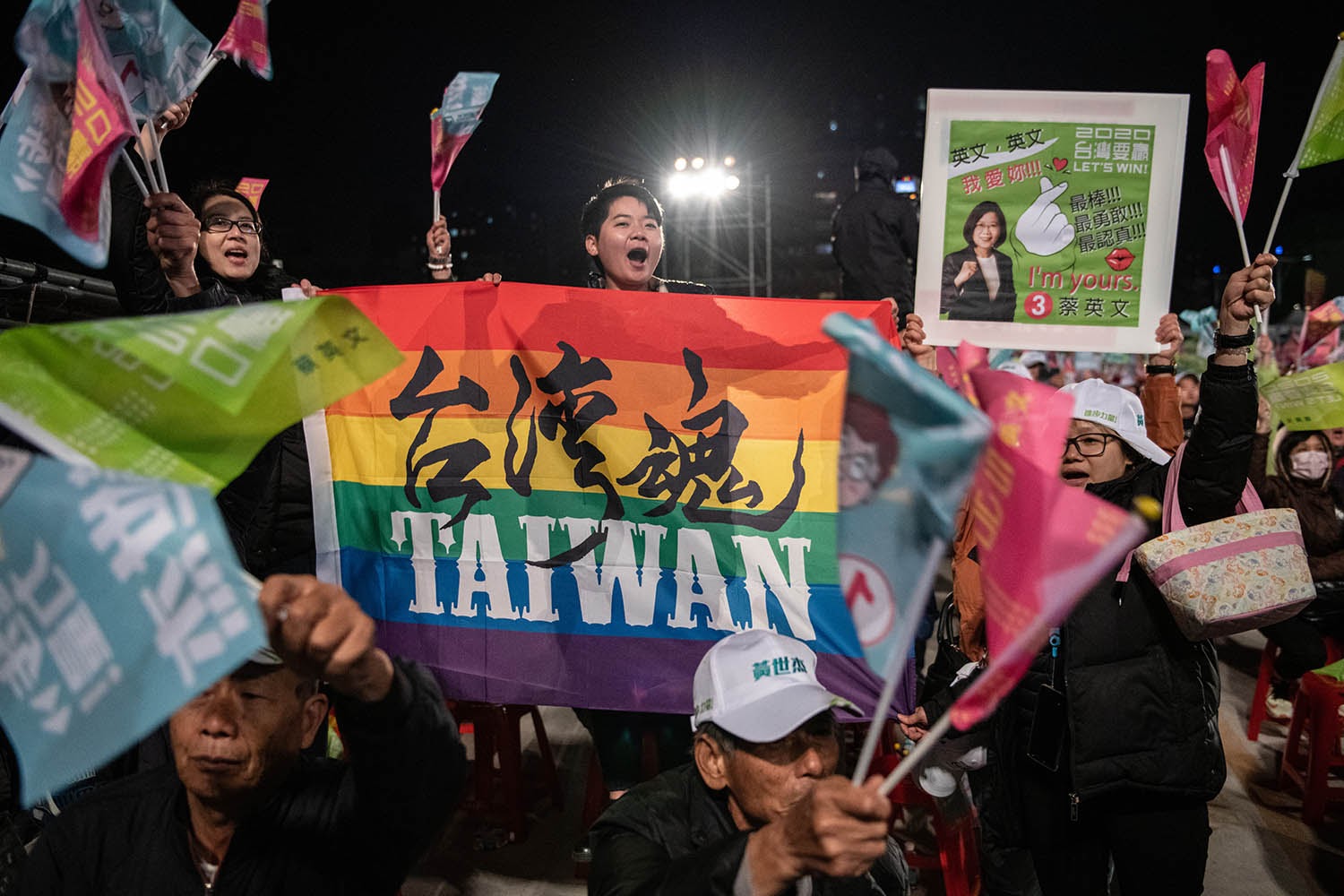
Left: Taiwan’s President Tsai Ing-wen from the ruling Democratic Progressive Party speaks during a campaign rally on Jan. 8. HAN LONG HEI/ECHOES WIRE/BARCROFT MEDIA VIA GETTY IMAGES Right: Supporters cheer and wave flags as Tsai speaks during a rally in Taoyuan on Jan. 8. CARL COURT/GETTY IMAGES
But it has also proved polarizing. The KMT has branded it a threat to Taiwan’s democracy. The DPP has responded by saying the true threat lies across the Taiwan Strait. The law was passed in a 67-0 vote, boycotted by every KMT lawmaker as protesters rallied outside the legislature. Days before the election, Taiwan is bitterly divided.
Beijing’s hunger for cross-strait influence goes back decades, dating to when the Chinese and Taiwanese governments used billboards and loudspeakers to broadcast propaganda between China’s Fujian province and the outlying Taiwanese island of Kinmen, just one mile away. Nowadays, it has carried on into what officials and observers fear is a campaign to destabilize Taiwan’s democracy through traditional media and social media apps such as Line, a WhatsApp-like platform rife with disinformation circulating within closed chat groups—although it has proved difficult to discern what constitutes a Chinese state-run effort as opposed to the actions of private citizens.
“We haven’t seen much activity that we suspect from China engaging in the same behavior as, for example, we’ve seen from Russia and Iran,” said Lee Foster, a senior manager for information operations with the United States cybersecurity firm FireEye, after analyzing Taiwan’s November 2018 elections.
“We haven’t seen much activity that we suspect from China engaging in the same behavior as, for example, we’ve seen from Russia and Iran,” said Lee Foster, a senior manager for information operations with the United States cybersecurity firm FireEye, after analyzing Taiwan’s November 2018 elections.
He noted that Chinese internet users are often happy to defend their government online out of their own volition.
Even if China lacks a Russia-style large-scale disinformation apparatus, its state and private actors have successfully stirred the pot in Taiwan. The 2018 mayoral campaign of Kaohsiung’s Han Kuo-yu, now the KMT presidential candidate, received support from a Facebook group run by administrators in China, according to a June 2019 report, and Facebook recently removed several fan pages supporting his presidential run. Taiwan’s Want Want China Times media conglomerate—chaired by the notoriously Beijing-friendly businessman Tsai Eng-meng, and the target of massive rallies in Taipei decrying the proliferation of China-backed red media—has received directives and published paid content from Beijing’s Taiwan Affairs Office, according to reports by the Financial Times and Reuters. Want Want said it would sue the Financial Times, calling its report “fake news.”
The DPP has responded by pushing Taiwan’s National Communications Commission (NCC), which regulates broadcast and telecommunications operations, to strike back. The commission, along with Taiwanese authorities, has levied fines on news organizations and private citizens for spreading so-called fake news, including internet rumors—a controversial tactic that former NCC Chairperson Nicole Chan equated to a desire for censorship shortly after her resignation in April 2019.
“If there is any website, any TV station they report to be untrue or disinformation, they want the NCC to punish them or block the website,” Chan told Foreign Policy. “For me, it is impossible to do that. That is not the responsibility of the NCC.”
The agency announced in July 2019 that it would investigate the Want Want-run CtiTV and CTV, the television stations named in the Financial Times report, for potential violations of three broadcasting acts. An NCC spokesperson said the case could be transferred to other authorities if further security violations are found. The commission has not released results of its July investigation, but this past November, it said it would investigate CtiTV and CTV, along with Eastern Broadcasting Co., after the self-proclaimed former Chinese spy Wang Liqiang said they had been paid by China to disparage the DPP.
The KMT has seized on the opportunity to cast the DPP as an enemy of free speech, accusing the NCC of targeting media outlets that favor the opposition party. “Does the NCC work for the public or work for the DPP?” Han, the KMT candidate, wrote on Facebook after the NCC announced its November investigation. Han added a hashtag meaning “green terror”—a play on the DPP’s symbolic color and the White Terror, a term for martial law under the KMT dictator Chiang Kai-shek, weaponized by the campaign in increasingly incensed attacks on the ruling party.
Last March, Taiwan’s Foreign Minister Joseph Wu touted his country’s freedom of expression on Twitter. “I’ve said it before: Tweeting is fun! The people of #China should be allowed to enjoy it, too,” Wu wrote. “And there’s no need to fear wumao, we don’t have any in #Taiwan.”
Taiwan may be free of China’s notorious wumao, or “50 Cent Army,” known for publishing articles and forum posts that positively portray the Chinese government, but it is hardly free from the threat of domestically generated disinformation. As the DPP frames Saturday’s presidential election as a battle between democracy and unification with China, it has left itself vulnerable to waves of accusations—ridiculous as many of them may be—that its designs for a disinformation-free media are interlaced with a desire to deny free speech for political enemies.
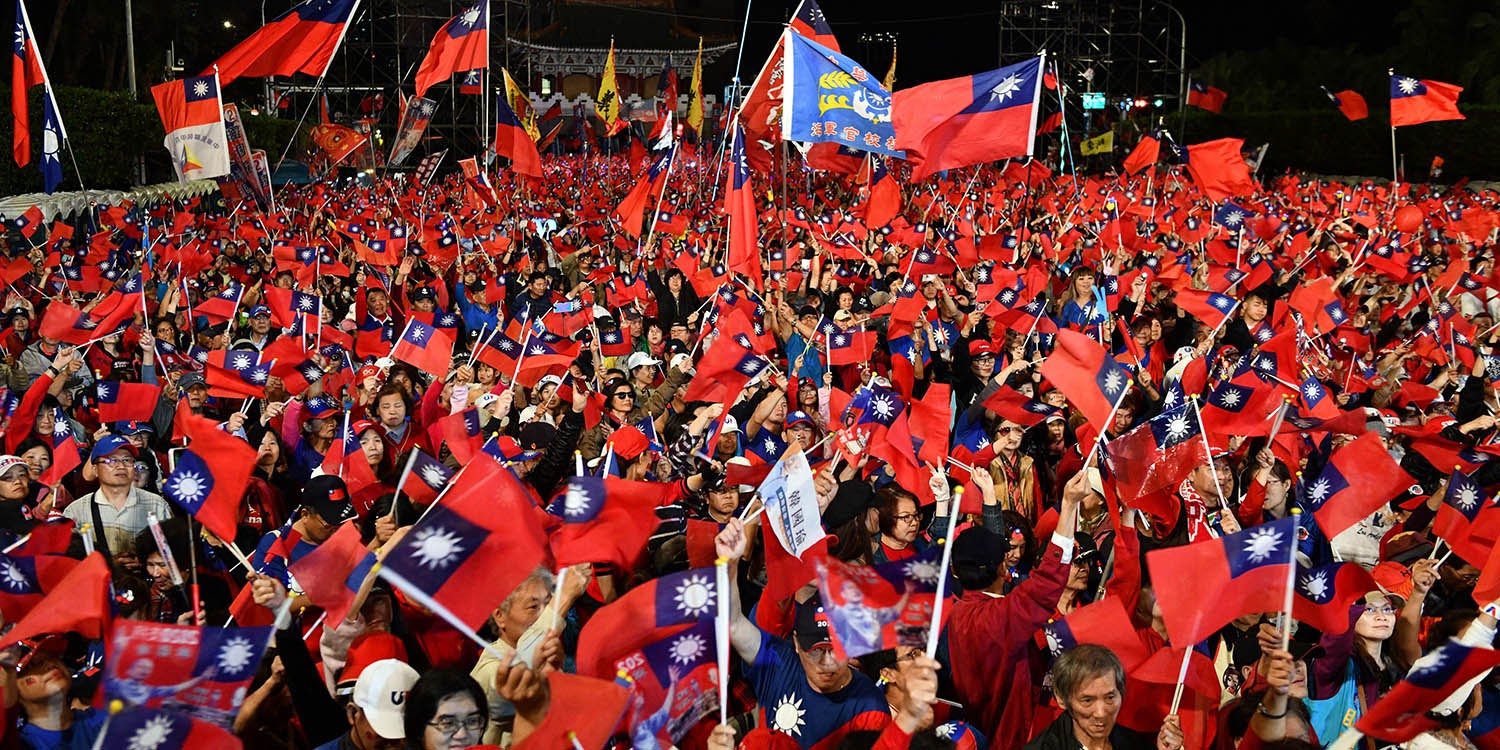 Supporters wave Taiwanese flags during a campaign rally for Han Kuo-yu, the Kuomintang candidate and more pro-Beijing challenger to the sitting president, in Taipei on Jan. 9. CARL COURT/GETTY IMAGES
Supporters wave Taiwanese flags during a campaign rally for Han Kuo-yu, the Kuomintang candidate and more pro-Beijing challenger to the sitting president, in Taipei on Jan. 9. CARL COURT/GETTY IMAGES
Taiwan, Wu told an audience in Los Angeles in March 2019, is “the first line of defense in an ideological battle that is taking place … in like-minded societies all over the world.”
“We have felt the brunt of China’s intensified campaign to subvert Taiwan’s democracy every day, through military intimidation, economic coercion, diplomatic assaults, disinformation, and political subversion, seeking to undermine our elected government and interfere with our elections,” he said.
Since it swept to power in 2016, Taiwan’s ruling DPP government has operated in a climate of cross-strait acrimony. Beijing quickly severed all ties between officials on opposite sides of the Taiwan Strait and has engaged in a campaign to limit Taiwan’s international image, poaching its diplomatic allies and pressuring international organizations and corporations to refer to Taiwan on its terms rather than those of Taipei. And Chinese actors have been behind false reports targeting Taiwan ranging from the genuinely harmful to the benign. In 2016, the Chinese People’s Liberation Army Air Force published a photo of a fighter jet flying near a Taiwanese mountain, leading to speculation it was doctored. In 2018, an online post claiming Honduras, one of Taipei’s 15 remaining diplomatic allies, was on the verge of defecting to Beijing was quickly debunked and allegedly sourced to a Chinese IP address.
Prior to the November 2018 regional elections, which saw the DPP suffer a crushing islandwide defeat, a national security source told the Taipei Times a Chinese government agency was responsible for using disinformation to influence public morale, but the source did not elaborate. Days before polls opened, Tsai warned against online falsehoods in a Facebook post.
However, experts say it is unlikely Chinese influence actors played a significant role in the DPP defeat.
However, experts say it is unlikely Chinese influence actors played a significant role in the DPP defeat.
While Chinese internet users made significant efforts to support KMT candidates online—and Want Want media outlets pushed KMT candidates such as Han Kuo-yu in Kaohsiung—the seeds of discontent had already been planted by what voters perceived as domestic policy failures, leaving them eager to punish what they saw as an underperforming ruling party.
Talk of Chinese meddling in Taiwan’s elections died down after the vote, likely due to the DPP’s reluctance to blame its defeat on outside forces as its members picked up the pieces. But in recent months, with a resurgent Tsai regaining popularity by promising to safeguard democracy from China as protests in Hong Kong surged, the party has vowed to fight red media using punitive measures. The NCC was placed firmly at the forefront of the battle.
In March 2019, the NCC fined the Want Want-run CtiTV News 1 million new Taiwan dollars (about $33,000) for failing to fact-check reports favorable to Han and other KMT mayors. The commission also said it analyzed the station’s news broadcasts for one week in February of that year and found that on one day coverage of Han made up 56.7 percent of the network’s total content.
“We are not saying that CtiTV cannot report on Han, but it must follow its code of conduct and self-discipline guidelines when covering him,” said Wong Po-tsung, then the NCC’s spokesman.
Days later, Wong became acting NCC chairperson after the resignation of Nicole Chan, widely reported to be under pressure from DPP legislators who accused her of not doing enough to punish networks for airing false or politically motivated reports. Within weeks, the NCC fined Want Want’s CTi News another NT$1 million for not fact-checking a man’s claim that 2.6 million pounds of pomelos had been dumped in a reservoir by farmers to rot, a report aired days before a critical legislative by-election in which the DPP incumbent was being challenged. In July 2019, it fined CtiTV News NT$1.6 million, about $50,000, for falsely reporting on the previous fines it had received from the NCC. Global best practices for combating false reports strongly discourage allowing a government body to police disinformation. Crackdowns on fake news in Singapore, Malaysia, Thailand, and other less democratic states have received global criticism. Taiwan’s new legislation is potentially as far-reaching as that of its Asian neighbors—and its recent moves have drawn hard scrutiny from observers within and outside of the country.
“When the government is in a position to declare something ‘fake news,’ it just opens the door to abuse,” said Steven Butler, the Asia program coordinator for the Committee to Protect Journalists (CPJ).
“In no case can the executive power take the responsibility to decide what is fake news and what is legitimate news,” said Cedric Alviani, the director of the Asia bureau of Reporters Without Borders, known by the French acronym RSF. “By finding scapegoats, blaming China, and not solving the problem, Taiwan is actually letting the gap narrow between itself and China.”
Alviani accused China of “exploiting a weakness” in Taiwan’s media environment, long a hotbed of poor journalistic standards as outlets rush to be first to publish. In response, the country has lent support to its nascent media watchdogs, including the first-of-its-kind Taiwan FactCheck Center, whose initial chief editor was hired last year by the public TV station CTS to implement verification methods at the broadcast level. As NCC chairperson, Chan oversaw the adoption of international fact-checking standards and asked TV stations to utilize those guidelines.
But Chan’s resistance to calls from within the DPP to wield the commission’s legal power to punish media outlets sympathetic to China—and to extend its regulatory domain into the policing of online content—ultimately led to her resignation, which Chan insists was voluntary. The NCC, Chan said, should never “get involved in true or false.”
In October 2018, DPP Legislator Cheng Pao-ching sharply questioned Chan’s performance. “It is like you are holding a sword of the state in your hand, but you never use it,” he said. DPP officials, including Premier Su Tseng-chang, renewed their criticism in March 2019, prior to the resignation of Chan, who had insisted on upholding the freedom of speech and using smart methods to combat fake news.
“The key word is ‘smart,’” Chan said of the DPP legislators critical of what they perceived as the NCC’s inaction. “They don’t get the points. They don’t know how to be smart.”
To Chan, this means committing to a rules-based approach to overseeing broadcast news content and not mixing external issues, such as regulating internet content and serving as arbiter of debates over the veracity of news, with the NCC’s actual scope of responsibility. Since resigning, Chan has urged Taiwan’s National Security Council to take the lead in defending Taiwan against foreign threats, a position echoed by many domestic critics.
Butler of CPJ said Taiwan should focus on investigating foul play by Want Want rather than penalizing its unbalanced coverage.
“If you bring attention to that and can actually find out the basis to that, that’s going to be a lot more effective than slapping a meaningless fine on a media property,” he said.
Chan expressed concern over the NCC’s penalty of CtiTV for dedicating too much coverage to Han Kuo-yu, saying that under her watch, her commission had favored disclosing the results of broadcasting fairness studies but letting the audience decide from there. “I don’t think it is appropriate to draw a line and set up a certain percentage” of coverage deemed as fair, she said.
Chiang Ya-chi, a professor researching comparative responses to disinformation campaigns at National Taiwan University of Science and Technology, warned that should government agencies be asked to decide on the veracity of a story, “we fall into a trap.”
“I think it’s very important [for the NCC] to establish a fair standard and apply that standard to everyone,” said Chiang, who has participated in government forums discussing responses to disinformation. She cautions against any steps that would further polarize Taiwan’s political environment—and as the KMT continues to attack the DPP as an enemy of free speech in Taiwan, that environment is becoming more polarized than ever.
“The government says disinformation is the enemy of an open and democratic society,” she said. “But we don’t want to lose that open society by fighting against it.”
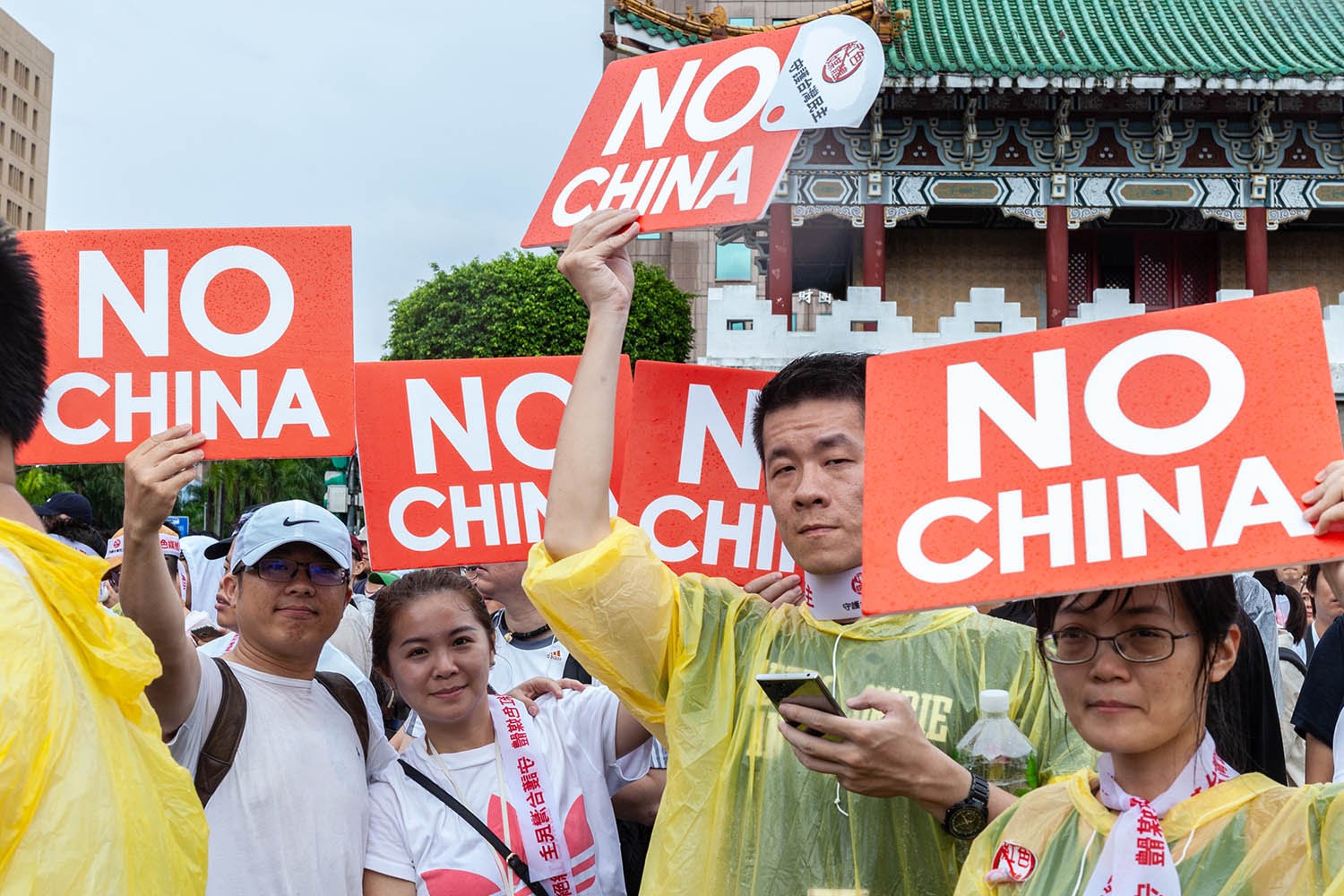 Protesters in Taipei hold signs stating their opposition to Chinese media disinformation and the Chinese Communist Party’s authoritarian rule in China on June 23, 2019. JOSE LOPES AMARAL/NURPHOTO VIA GETTY IMAGES
Protesters in Taipei hold signs stating their opposition to Chinese media disinformation and the Chinese Communist Party’s authoritarian rule in China on June 23, 2019. JOSE LOPES AMARAL/NURPHOTO VIA GETTY IMAGES
When someone cries “fake news,” it often sets a vicious cycle into motion. Accuse someone else of spreading fake news, as Taiwanese authorities have done to Want Want, and you are likely to be tagged as a source of fake news yourself, as Want Want has done to its critics.
This is why democratic governments have tried to recuse themselves from debates over true and false. When Audrey Tang, Taiwan’s first digital minister, oversaw the 2018 implementation of a real-time clarification platform for government ministries to respond to inaccurate or incomplete reports, she told me the platform was not a fact-checking mechanism.
But the government’s push to hold disinformation peddlers accountable—with its sights firmly set on influence from China—has led to an internal game of hot potato, with the NCC bearing the public brunt of facing a problem that other agencies, along with Taiwanese courts, have little interest in taking responsibility for. Taiwan’s new anti-infiltration law faces similar concerns, as critics note it does not clearly specify an arbiter assigned to investigate cases. Long-term solutions to healing Taiwan’s media environment, such as media literacy education campaigns, fail to satiate DPP officials who see the issue as an existential threat not only to Taiwan, but also to their own political survival.
The specter of Chinese meddling is thus being emphasized by the DPP and discounted by the KMT, leaving little room for Chinese influence to be properly defined and for claims of Chinese meddling to be verified before being repeated by politicians.
The specter of Chinese meddling is thus being emphasized by the DPP and discounted by the KMT, leaving little room for Chinese influence to be properly defined and for claims of Chinese meddling to be verified before being repeated by politicians.
Deputy Minister Chen of the Mainland Affairs Council, who in October 2019 claimed the Kansai airport post originated in a Shanghai content farm, said in an email his comments “were according to the published information at the time” and that Taiwan-based media had “cited a report on a Shanghai-based online platform guancha.cn.”
Most analysts and subsequent media reports repeated these claims as DPP officials continued to echo them without publicly providing concrete proof. The government’s handling of the Kansai incident, Chiang said, left it at risk of losing the trust of voters as it tries to raise awareness of actual disinformation from foreign forces. “The DPP government should present more evidence of the cases of disinformation they are asking the people to be aware of,” she said.
Joseph Wu, Taiwan’s foreign minister, quickly pushed for the Taiwanese student who allegedly made the false PTT post to be prosecuted. Wu cited Taiwan’s Social Order Maintenance Act, a law that penalizes those found guilty of spreading rumors that “undermine public order and peace.” The country’s legislature had previously proposed amending the law to punish purveyors of fake news, drawing a rebuke from CPJ.
“The authorities cannot just brush responsibility away and say, oh, let’s punish that kid. They have to face the problem,” said Alviani of RSF, referring to Taiwan’s own crumbling media environment. “To put all the blame on Chinese propaganda is a mistake.”
Lawmakers withdrew the proposed amendment, but the law has since been used to summon private citizens who share false information online—often those critical of the DPP. In July 2019, a man was referred to police after sharing a meme on Facebook falsely claiming the Tsai administration had spent millions on renovating the official presidential residence. Last week, the university professor Su Hung-dah said he received a police notice after posting a video this past November accusing the DPP of trying to destroy Taiwan’s National Palace Museum, which contains Chinese artifacts brought to the island by KMT forces after they fled China in 1949. The KMT candidate Han’s deputy chief campaign officer said the DPP was curtailing “freedom of speech and freedom of privacy,” while a KMT spokeswoman referred to reports of citizens being summoned by police as a “green terror.”
The police summons have amplified a KMT onslaught of unsubstantiated accusations, further fueled by the new anti-infiltration law, that a DPP “internet army” is targeting Han’s supporters. Its retaliation has become ugly: The party’s official Twitter account offered a “reward” for finding Slow Yang, the DPP-supporting YouTube personality charged with spreading Kansai airport rumors.
For Butler of CPJ, the practice of fining citizens for spreading false information is “a terrible weapon in the hand of the government.”
“To go in the direction of censorship, in the end, is going to be self-defeating,” he said.
Taiwan has also considered amending its draft digital communications act, which follows the Manila Principles of online freedom from censorship, to give targets of fake news the right to ask platforms hosting the content to remove it and compensate the victims, a requirement that Google Taiwan said would violate its policy of neutrality if passed. Chan, the former NCC minister who was a key figure behind the drafting of the bill, believes further changes may be proposed by DPP officials during the bill’s second and third readings.
Alviani has been critical of Taiwan’s fight against disinformation in the past. In 2018, the Mainland Affairs Council denied a journalist visa to a Chinese reporter after accusing him of spreading false information and “creating cross-strait conflict,” a move RSF sharply opposed. While Alviani does not advocate a full freedom to publish anything without consequences—which he calls the “freedom of the strong to impose propaganda”—his organization wants to see Taiwan improve its own media environment rather than pointing its finger at China.
Taiwan, Alviani noted, regularly places among the top Asian countries in RSF’s annual Press Freedom Index—but “it’s not because the Taiwanese media is so outstanding.” Instead, he said, it is “because the whole of Asia is run by strongmen, by dictatorships.”














